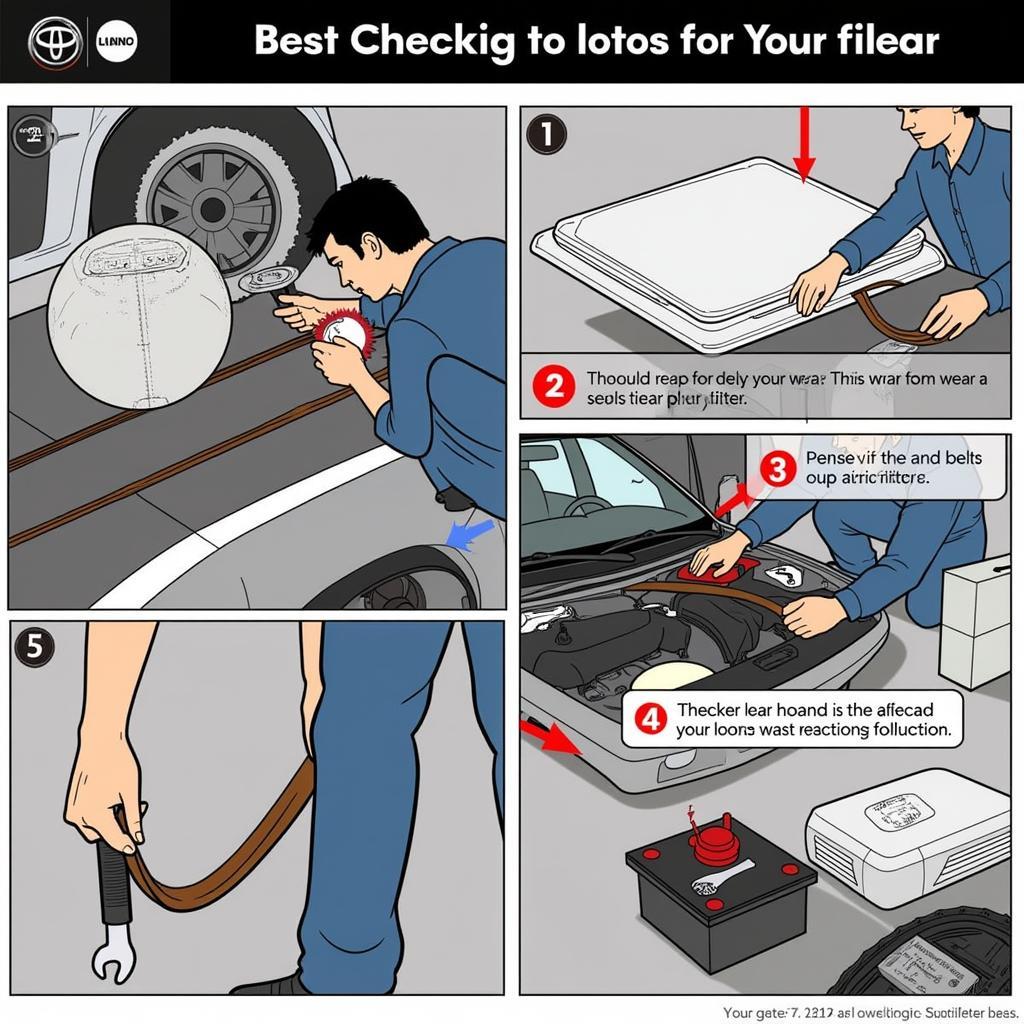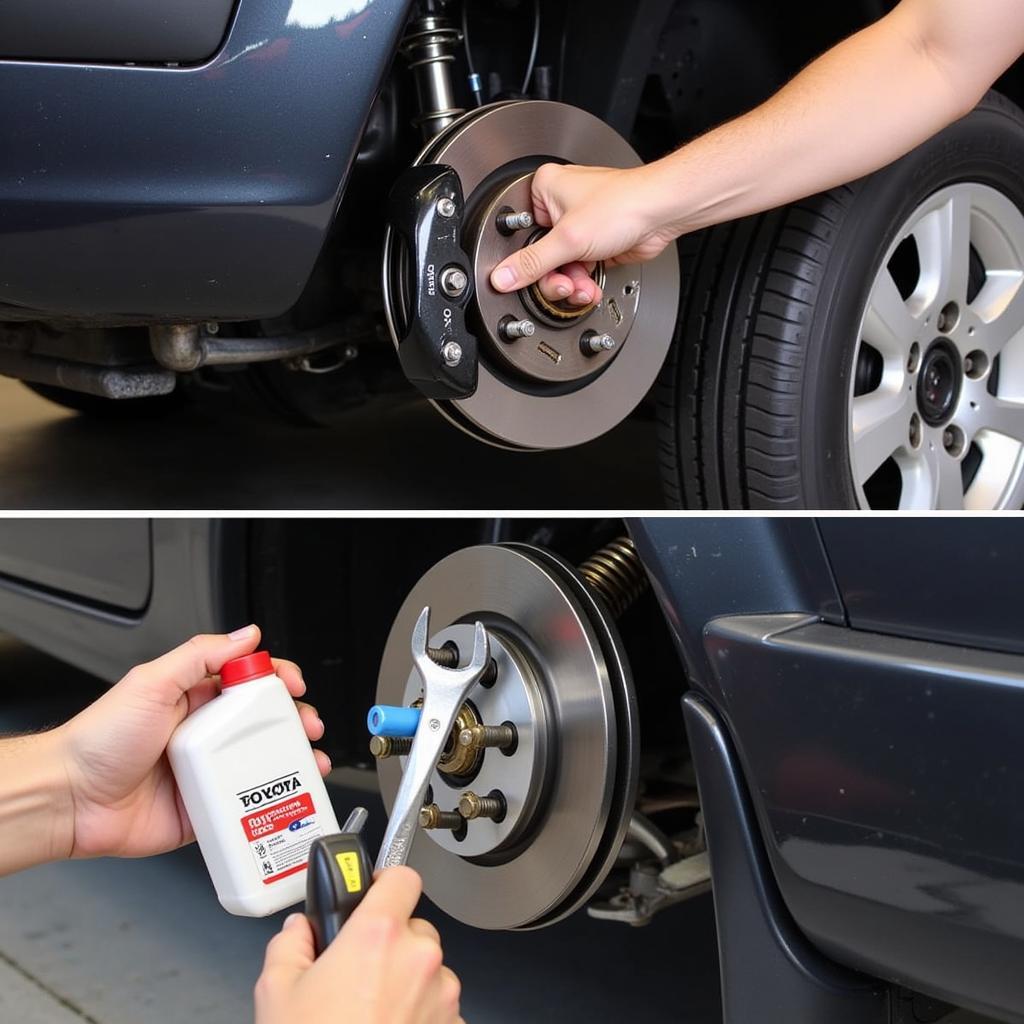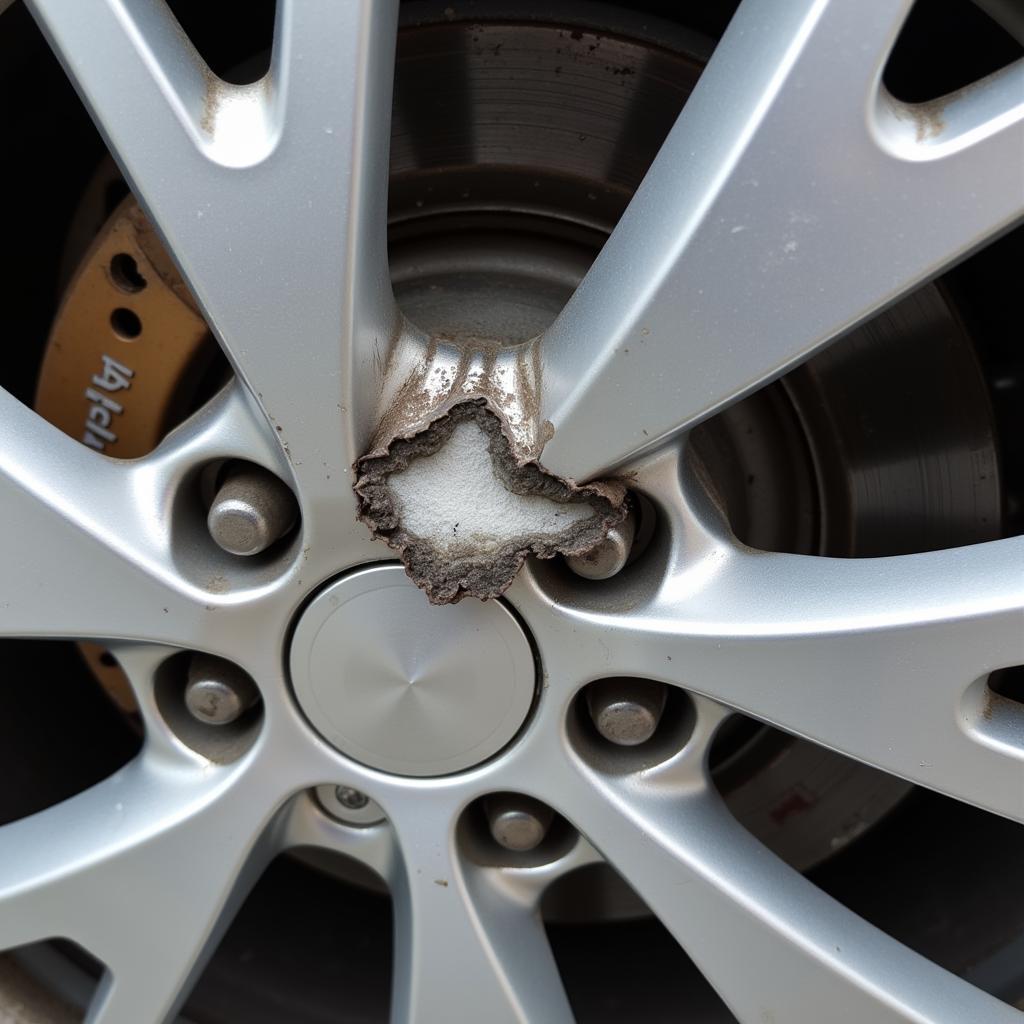Keeping your Toyota running smoothly means staying on top of its maintenance. A well-maintained vehicle not only ensures a safer and more enjoyable driving experience but also contributes to a longer lifespan and better resale value. This Toyota Car Maintenance Checklist will provide you with a comprehensive guide to keep your Toyota in peak condition.
Whether you’re a seasoned mechanic or a first-time Toyota owner, this guide has something for everyone. We’ll cover everything from routine checks to more in-depth maintenance tasks. Understanding your Toyota’s specific maintenance requirements outlined in your owner’s manual is crucial, as this checklist provides a general overview. Having a consistent toyota car maintenance checklist is vital for maximizing the life and performance of your vehicle.
If you’re looking for vehicles with minimal maintenance requirements, you might want to check out cars with the least maintenance issues.
Regular maintenance ensures your vehicle performs reliably and safely. But what does routine maintenance mean on a car? It involves checks, inspections, and part replacements done regularly to prevent breakdowns and ensure optimal performance.
Essential Daily/Weekly Checks for Your Toyota
Before hitting the road, a few simple checks can prevent unexpected issues. These checks are quick and easy, even for those who aren’t mechanically inclined.
- Check your tire pressure: Proper inflation is crucial for fuel efficiency and handling.
- Inspect your fluid levels: Engine oil, coolant, brake fluid, and power steering fluid should be at the recommended levels.
- Examine your lights: Make sure all your lights are functioning correctly, including headlights, taillights, brake lights, and turn signals.
- Check your wipers: Ensure your wiper blades are in good condition and clear your windshield effectively.
These simple checks can go a long way in preventing problems down the road.
Monthly Toyota Car Maintenance Checklist Items
Taking a little extra time each month for slightly more in-depth checks can help identify potential issues before they become major problems.
- Inspect your belts and hoses: Look for cracks, wear, or fraying.
- Check your air filter: A dirty air filter can reduce fuel efficiency and engine performance.
- Inspect your battery terminals: Ensure they are clean and free of corrosion.
These checks are especially important for older vehicles and those driven in harsh conditions.
 Monthly Toyota Car Maintenance Items
Monthly Toyota Car Maintenance Items
Every 3,000-5,000 Miles: Crucial Toyota Car Maintenance
This interval is key for keeping your Toyota in top shape. Your owner’s manual provides the specific mileage recommendations for your model.
- Oil and filter change: This is the most important maintenance task for your engine’s health.
- Tire rotation: Rotating your tires ensures even wear and extends their lifespan.
Sticking to this schedule prevents premature wear and tear on essential components.
6-Month/10,000 Mile Toyota Car Maintenance
Every six months or 10,000 miles, depending on your driving habits and the conditions you typically drive in, a few more items need attention.
- Brake inspection: Check the brake pads and rotors for wear and tear.
- Transmission fluid check: Ensure the fluid level and condition are within the recommended range.
These checks contribute to your safety and the longevity of your vehicle.
Are you curious about which vehicles offer the best free maintenance packages? Take a look at cars with best free maintenance to learn more.
 Six-Month Toyota Maintenance Tasks
Six-Month Toyota Maintenance Tasks
Annual Toyota Car Maintenance Checklist
Once a year, a more thorough inspection is recommended. This is a good time to have a professional mechanic perform a complete checkup.
- Cooling system flush: This helps prevent corrosion and overheating.
- Spark plug replacement: New spark plugs ensure efficient combustion.
These tasks can be more complex and may require specialized tools.
Wondering if Jaguars require a lot of maintenance? Explore this question: are jaguars high maintenance cars.
Why is Toyota Car Maintenance Important?
- Safety: Regular maintenance ensures your vehicle operates safely and reliably.
- Performance: Well-maintained vehicles perform better and are more fuel-efficient.
- Resale Value: A well-documented maintenance history increases your car’s resale value.
 Importance of Toyota Car Maintenance
Importance of Toyota Car Maintenance
“Preventive maintenance is always cheaper than reactive repairs. A little time and effort invested in regular maintenance can save you a lot of money and headaches in the long run.” – John Davis, Certified Automotive Technician
Addressing Toyota Car Maintenance Icons
Understanding the meaning of the various warning lights on your dashboard is crucial. You can find more information about toyota car maintenance icons online. Don’t ignore these warnings; they indicate potential problems that need attention.
“Addressing warning lights promptly is essential for preventing further damage to your vehicle. Ignoring them can lead to more costly repairs down the line.” – Maria Sanchez, Automotive Engineer
Conclusion
Following a toyota car maintenance checklist is essential for ensuring the longevity, reliability, and safety of your vehicle. From daily checks to annual inspections, this guide provides a comprehensive overview of the essential maintenance tasks for your Toyota. Remember to consult your owner’s manual for specific recommendations for your model. For further assistance or to schedule a service appointment, don’t hesitate to contact us at AutoTipPro. You can reach us at +1 (641) 206-8880 or visit our office located at 500 N St Mary’s St, San Antonio, TX 78205, United States.
FAQ
- How often should I change my Toyota’s oil? Consult your owner’s manual for the specific recommendation, but it’s typically every 3,000-5,000 miles.
- What is included in a basic Toyota service? A basic service usually includes an oil change, filter replacement, and a multi-point inspection.
- How can I tell if my tires need to be rotated? Uneven wear patterns on the tires indicate they need to be rotated.
- What should I do if a warning light comes on? Consult your owner’s manual and consider taking your vehicle to a qualified mechanic.
- How often should I have my brakes inspected? It’s recommended to have your brakes inspected every 6 months or 10,000 miles.
- What is a cooling system flush? A cooling system flush removes contaminants from the cooling system and helps prevent corrosion.
- Why is it important to replace spark plugs? Worn spark plugs can reduce fuel efficiency and engine performance.





Leave a Reply